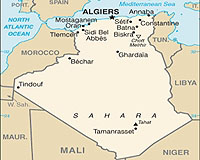| . |  |
. |
Sanaa, Yemen (UPI) Oct 11, 2010 Somalia and Yemen, the first a failed state and other on its way, will be the next battlegrounds in the struggle against terrorism, Western analysts warn. U.S. forces are allegedly waging secret wars in both these impoverished, tribal lands that command strategic shipping lanes. These are reportedly being waged largely from a former French Foreign Legion camp in Djibouti, which lies between the two states. Those campaigns are likely to escalate to prevent jihadists and their fellow travelers from seizing control of Somalia and Yemen. Some analysts, like former CIA officer Philip Giraldi, say the United States shouldn't get any more involved in these conflicts than it is already, which is largely low-key support activity with the occasional airstrike or assassination by Special Forces. Somalia and Yemen, he argues, "are frontline states in the burgeoning but still secret phase three of the Global War on Terror being planned in the Pentagon and spy agencies with the concurrence of the Barack Obama White House "The administration is clearly thinking beyond Afghanistan (and even Iran), anticipating the next battlefronts in Yemen and Somalia. "It is assiduously gathering resources to enter the fray, including setting up business fronts that can be used by covert operatives," Giraldi wrote in The American Conservative. "We are again talking of secret wars conducted in places where we do not understand the local issues or players very well, all part of a massive over-reaction directed against low-level troublemakers who do not actually pose any serious threat against the United States. "Where it will all lead is anyone's guess " Al-Qaida in the Arabian Peninsula, based in Yemen, is becoming stronger all the time, as evidenced by attacks on British and French targets in Sanaa, the capital, in recent days. The network has also been involved in attacks on the United States, including the Christmas Day 2009 attempt to blow up a U.S. airliner over Detroit. Another former CIA official, Bruce Riedel, cautioned: "The world cannot afford Yemen becoming a failed state a la Somalia. "One failed state in the Gulf of Aden is bad enough. Two failed states with al-Qaida operating in both of them would be a very dangerous situation since the Gulf of Aden's where the world's energy resources sail through every day." Stepping up U.S. operations against AQAP is essential, says Riedel, currently a Brookings Institution analyst, because Yemeni President Ali Abdullah Saleh is a "flawed partner" more concerned with regime survival than fighting al-Qaida. Justin Marozzi of Albany Associates, a U.K. company specializing in public diplomacy strategies, sees the emergence of the militant Islamist al-Shabaab movement as a looming international threat. Al-Shabaab, which has confined the Western-backed Transitional Federal Government to a small corner of the capital, Mogadishu, has long had ideological links with al-Qaida. In recent months it reportedly has been stiffened by jihadist veterans from Afghanistan and Pakistan. This coincided with July bombings in Kampala, capital of Uganda, which backs the TFG as part of an African Union peacekeeping force that killed 79 people. The attacks were claimed by al-Shabaab but they were almost certainly planned and carried out by foreign jihadists. Western intelligence fears the bombings, the first linked to al-Shabaab outside Somalia, point to a new capability by the Horn of Africa jihadists to extend their reach. "Al-Shabaab's rise is a threat to the international community," Marozzi wrote in a Financial Times analysis that warned the West it ignored Somalia at its peril. "First, Somalia is becoming a safe haven for foreign fighters schooled in Iraq and Afghanistan. Second, the group has recruited successfully from the Somali diaspora. "The suicide bomber who killed 23 people during a graduation ceremony in Mogadishu last December was a Danish Somali. "One of the group's highest-profile fighters is a Somali-American. Somali-Australians have already tried, unsuccessfully, to attack an Australian military base. "How can the world help Somalia pull back from the brink?" Marozzi asked. "It is tempting to dismiss this as too difficult and too dangerous "Yet the Kampala attacks underline the folly of 'constructive disengagement,' as advocated in a Council of Foreign Relations paper. It was disengagement from Somalia not engagement that led to the current crisis The world can no longer look away."
Share This Article With Planet Earth
Related Links The Long War - Doctrine and Application
 Algeria upset by French push on al-Qaida
Algeria upset by French push on al-QaidaAlgiers, Algeria (UPI) Oct 5, 2010 France's self-declared war against al-Qaida's North African network is causing anxiety in a region where the former colonial power is still viewed with disdain and the ploy could backfire on French President Nicolas Sarkozy. The French became involved in the shooting war with al-Qaida of the Islamic Maghreb in July when it deployed Special Forces troops with Mauritania's military in an ... read more |
|
| The content herein, unless otherwise known to be public domain, are Copyright 1995-2010 - SpaceDaily. AFP and UPI Wire Stories are copyright Agence France-Presse and United Press International. ESA Portal Reports are copyright European Space Agency. All NASA sourced material is public domain. Additional copyrights may apply in whole or part to other bona fide parties. Advertising does not imply endorsement,agreement or approval of any opinions, statements or information provided by SpaceDaily on any Web page published or hosted by SpaceDaily. Privacy Statement |